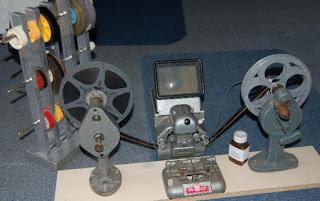
It wasn't long before I got pushed up into editing. This image above was exactly how I worked it. This was where I edited commercials and install them. between the movies. Remember this was before video. I actually had to edit the commercials with glue. Yeah, glue. I think I edited commercials and movies where I learned how to edit.
I moved pretty fast through the TV station and suddenly got a job upstairs, where radio news and TV news were. This was the real thing. I was an editor for radio. As I said before, radio and TV. I had to learn fast in radio, it was probably the hardest job I ever did. Our station was music and breaked twice for news. I had crazy dreams during that job. Our station was sent towards the U.S. and we had mostly American DJ's and or signal for radio went to at least 5 or 6 states. They called us "The Big 8", meaning our radio number had the 8 on the radio.
But eventually I had to let it go, I never slept right at that job and I figured I'd be fired. But the day the radio part let me go, I just stepped into our TV news unit, consisting of one reporter, one newswriter and one sound recorder. Much smaller than the "Big 8". And I was glad they kept me and I was now closer to movies.
Well, not quite movies yet.
And I was only the soundman on the 3-man unit.
It was where I learned about cameras. I had a cheap old camera my dad had but that was all I knew about real cameras. I remember when the cameraman handed me a small photo camera and asked me what I thought about it. It was a camera for me, ordinary. It took me a few months to figure out that it was a Leica camera, the best photo camera around. German.
So now I was close to a camera, any camera and I learned to process film for both still photos and 16mm film, which was the standard for TV film everywhere, both still camera and movie film. I was not holding the cameras yet, but I knew all the pieces and was just waiting.
Remember that I was on the Canadian side and Detroit was on the other side. That meant we would drive over to the city of 5 million while our town was a hundred thousand. Big difference.
I immediately fell in love with Detroit, even had a handful of relatives also American. Now that I was over to Detroit for news I was the happiest guy I knew. We went across during the riots and toughened up, learning more about America.
And then something did happen.
We were filming news about the automobile strike from Ford. Ford was one of 3 major companies, Ford, GM and Chrysler would have on company strike and whatever the changes were made, only one company had the strike. And once it was over the "Big 3" would all have the new changes in money to employees.
So we were interviewing a Ford employee who was a spokesman for his unit. He was a nice man, talking with us and we filmed him. He left to go outside and we picked up our gear until suddenly came running in, shouting there was a fight.
Naturally we picked up our gear and looked to see what was going on. Outside, we could see our friendly union man angry and someone else was angry.
And then we saw them, and I instantly released that the man we spoke to was handed a handgun and aimed it and fired at the other man. Panic everywhere, some people pulled our
camera away and in what seemed like seconds, everyone was gone.
We wondered if we got the film but had to go back to our station to get the film out fast. And when I pulled the film out, it was perfectly clear.
The film went around everywhere and the New York Times actually printed a frame from the 16mm film. It was quite poor because of it's 16mm grain, but it showed.
I was married now, my wife worked at the station also, and I told her how it all went down and how fast everything went. I never forgot it.
And I liked what I was doing even more.
And I was getting closer to film cameras.
